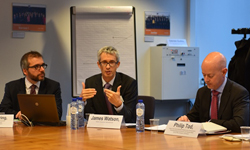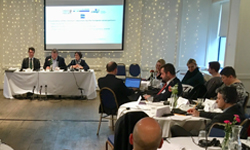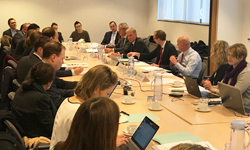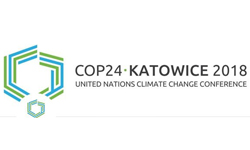BusinessEurope Headlines No. 2018-05
Industrial policy should be high up on the agenda
 The informal meeting of the EU ministers responsible for competitiveness took place in Sofia on 1 February 2018 under the Bulgarian Presidency of the Council of the European Union. An industrial strategy for Europe was among the key topics discussed. BusinessEurope Director General Markus J. Beyrer, invited to speak at the meeting, underlined: “We must put industrial policy high on the political agenda in the coming months and keep up the pace of the progress achieved in the last months. One of the key points that still needs a thorough reflexion is the long-term vision for the EU’s industry. A key objective of a revised industrial strategy must be to ensure the EU policy can steer positive change and have the tools to handle difficult challenges ahead, be it job changes due to technological development, the effects of an ageing population, or the energy transition.” Photo copyright: Yordan Simeonov (EU2018BG)
The informal meeting of the EU ministers responsible for competitiveness took place in Sofia on 1 February 2018 under the Bulgarian Presidency of the Council of the European Union. An industrial strategy for Europe was among the key topics discussed. BusinessEurope Director General Markus J. Beyrer, invited to speak at the meeting, underlined: “We must put industrial policy high on the political agenda in the coming months and keep up the pace of the progress achieved in the last months. One of the key points that still needs a thorough reflexion is the long-term vision for the EU’s industry. A key objective of a revised industrial strategy must be to ensure the EU policy can steer positive change and have the tools to handle difficult challenges ahead, be it job changes due to technological development, the effects of an ageing population, or the energy transition.” Photo copyright: Yordan Simeonov (EU2018BG)
![]() Contact: Joana Valente
Contact: Joana Valente
European Commission event on Economic Outlook
 EU growth is presently strong, but more needs to be done to improve our long-term growth capacity once tail winds, such as those created by European Central Bank (ECB) asset purchases, ease. This was the key message of BusinessEurope’s Economics Director, James Watson, at a European Commission event for micro, small and medium-sized enterprises (SMEs) stakeholders on 31 January 2018. At the event, James drew the attention of the small business representatives to many of the long-term weaknesses of the EU economy identified in BusinessEurope annual Reform Barometer, which need to be address in order to strengthen growth and competitiveness. For instance, research and development (R&D) remains well below its 3% target across the EU; the EU lags well behind the US in terms of international measures of ease of doing business; our capital markets, particularly for start-ups remain small by US standards, and high taxes on labour are discouraging employment creation. As well as supporting reforms at Member State level, efforts to complete the Single Market and strengthen Economic and Monetary Union (EMU) must be a priority for the EU.
EU growth is presently strong, but more needs to be done to improve our long-term growth capacity once tail winds, such as those created by European Central Bank (ECB) asset purchases, ease. This was the key message of BusinessEurope’s Economics Director, James Watson, at a European Commission event for micro, small and medium-sized enterprises (SMEs) stakeholders on 31 January 2018. At the event, James drew the attention of the small business representatives to many of the long-term weaknesses of the EU economy identified in BusinessEurope annual Reform Barometer, which need to be address in order to strengthen growth and competitiveness. For instance, research and development (R&D) remains well below its 3% target across the EU; the EU lags well behind the US in terms of international measures of ease of doing business; our capital markets, particularly for start-ups remain small by US standards, and high taxes on labour are discouraging employment creation. As well as supporting reforms at Member State level, efforts to complete the Single Market and strengthen Economic and Monetary Union (EMU) must be a priority for the EU.
![]() Contact: James Watson
Contact: James Watson
Social dialogue to foster labour market flexibility
 Reforms are necessary to encourage employers to hire and to adapt labour markets to changing economies and societies. As part of this, social dialogue can help provide solutions strengthening companies’ competitiveness and labour market flexibility, including working conditions that reflect employers and workers changing needs. “What we want to foster at EU level is a reform partnership so that labour market performance is enhanced across Europe, with social partners learning from each other on how to address the labour market challenges they face”, said BusinessEurope Social Affairs Director Maxime Cerutti during the second cluster seminar on “Reinforcing the EU social dialogue and industrial relations”, organised by the European social partners in Dublin on 30 and 31 January 2018. This seminar brought together social partners representatives from Ireland, Austria, Croatia and Poland.
Reforms are necessary to encourage employers to hire and to adapt labour markets to changing economies and societies. As part of this, social dialogue can help provide solutions strengthening companies’ competitiveness and labour market flexibility, including working conditions that reflect employers and workers changing needs. “What we want to foster at EU level is a reform partnership so that labour market performance is enhanced across Europe, with social partners learning from each other on how to address the labour market challenges they face”, said BusinessEurope Social Affairs Director Maxime Cerutti during the second cluster seminar on “Reinforcing the EU social dialogue and industrial relations”, organised by the European social partners in Dublin on 30 and 31 January 2018. This seminar brought together social partners representatives from Ireland, Austria, Croatia and Poland.
Contact: Maxime Cerutti
Overview on EU State Aid Policy
 The Deputy Director General for State Aid at the European Commission Directorate-General for Competition, Gert-Jan Koopman, attended the meeting of the BusinessEurope’s State Aid working group on 6 February 2018. He gave an overview on the modernisation of State Aid control to simplify procedures and focus on measures that genuinely affect competition in the internal market. He mentioned that the General Block Exemption Regulations reduced the number of notifications significantly, freeing up Commission resources to focus on important cases. Koopman also reported about the recent transparency register and on-going evaluations.
The Deputy Director General for State Aid at the European Commission Directorate-General for Competition, Gert-Jan Koopman, attended the meeting of the BusinessEurope’s State Aid working group on 6 February 2018. He gave an overview on the modernisation of State Aid control to simplify procedures and focus on measures that genuinely affect competition in the internal market. He mentioned that the General Block Exemption Regulations reduced the number of notifications significantly, freeing up Commission resources to focus on important cases. Koopman also reported about the recent transparency register and on-going evaluations.
Contact: Erik Berggren
Business community needs a recognised focal point at UN Climate Talks
 To assure that information from the business community reaches the Parties at the UN Climate Talks, BusinessEurope calls on the United Nations Framework Convention on Climate Change (UNFCCC) to begin building a recognised business channel. Similar to the UN Platform for the Indigenous and Local Communities stakeholder group, businesses can provide a unique role in shaping climate action and provide real input in reviewing and updating national climate pledges (called NDCs). First and foremost, it is pivotal that such a business channel will build on inclusiveness of business communities both in developed and developing countries. Please see BusinessEurope’s submission letter for more details.
To assure that information from the business community reaches the Parties at the UN Climate Talks, BusinessEurope calls on the United Nations Framework Convention on Climate Change (UNFCCC) to begin building a recognised business channel. Similar to the UN Platform for the Indigenous and Local Communities stakeholder group, businesses can provide a unique role in shaping climate action and provide real input in reviewing and updating national climate pledges (called NDCs). First and foremost, it is pivotal that such a business channel will build on inclusiveness of business communities both in developed and developing countries. Please see BusinessEurope’s submission letter for more details.
Contact: Leon de Graaf
Calendar 
- 12-13 February: Global Business Coalition Plenary Meeting, Washington DC
- 20-21 February: Circular Economy Stakeholder Conference
- 21 February: Company law package
- 22-23 February: Second European Industry Day
- 23 February: Informal meeting of Heads of State or Government
- 23-24 February: Informal European Council
- 28 February: European Semester Winter Package